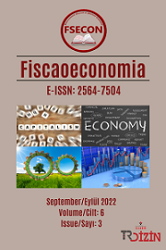XVIII. Yüzyıl Fransa’sında Vergiler ve Vergi İsyanları
Taxes and Tax Revolts in Eighteenth-Century France
Author(s): Zeynep AğdemirSubject(s): Economic history, Political economy, 18th Century, Public Finances, Fiscal Politics / Budgeting
Published by: Ahmet Arif Eren
Keywords: French Revolution; Ancien Régime Tax; Tax Revolts;
Summary/Abstract: The primary objective of this study is to attempt to comprehend taxes and tax revolts in eighteenth-century France by examining them in conjunction with the period's fundamental social dynamics. The article attempts to demonstrate in this context that fiscal events can be understood in conjunction with the history of social struggle rather than through technical analysis. The 18th century is a significant historical epoch because it witnessed the French Revolution, with taxes serving as the spark that ignited the revolution. In this context, the article attempted to evaluate 18th-century France by dividing it into two periods prior to and following the 1789 Revolution. At first, the study attempted to analyze it by examining the fundamental social trends in cities and rural areas prior to the 1789 Revolution. Following that, the fundamental characteristics of the financial structure prior to the French Revolution were evaluated. The study also discusses the revolts that occurred during the Revolution, the Girondin and Jacobin governments, and the financial implications of the conservative phase of the Revolution. The fiscal meaning of the ancien régime was the nobility's tax privileges, the heavy taxes imposed on peasants, and the inequity in taxation. In the 18th century, trade and manufacturing began to encircle the nobility's economic dominance, and villages began to disintegrate. The increasing burden on the state finances as a result of the increasing wars rendered the finances inoperable under the ancien régime's rules, and the nobles' tax privileges came under scrutiny. The state's fiscal crisis, coupled with the inability to collect new taxes due to noble resistance, sparked debate over taxes and triggered the process leading to the revolution. The Revolution of 1789 created an enabling environment for the abolition of the ancien régime's fiscal injustice. The abolition of nobles' tax privileges and the transfer of tax authority from the king to the National Assembly were forced upon the Parisians. On the other hand, the Jacobin and Girondin governments pursued very different fiscal policies. Numerous fiscal gains made by 1789 were eroded during the conservative phase of the revolution.
Journal: Fiscaoeconomia
- Issue Year: 6/2022
- Issue No: 3
- Page Range: 1525-1544
- Page Count: 20
- Language: Turkish

